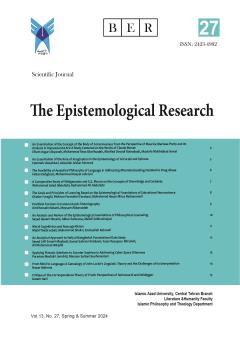Explanation and examination of the epistemological foundations of philosophical counseling
Subject Areas : Epistemological researches
Seyed Hesam Hosaini
1
*
![]() ,
Akbar Rahnama
2
,
Akbar Rahnama
2
![]() ,
مهدی سبحانی نژاد
3
,
مهدی سبحانی نژاد
3
1 - Department of Philosophy of Education, Faculty Educational Sciences, University of Shahed, Tehran, Iran.
2 - Professor, Department of Philosophy of Education, Faculty of Educational Sciences, University of Shahed, Tehran, Iran
3 - استاد دانشگاه شاهد
Keywords: philosophical counseling, epistemology, worldview, client,
Abstract :
This research was done with the purpose of explaining and investigating the epistemological foundations of philosophical counseling. Methods: The type of this research is theoretical in terms of purpose and qualitative in terms of approach. Various methods were used to collect data and to achieve the objectives of the research. The main method used in this research is the analytical method. For this purpose, the method of conceptual analysis and interpretation and conceptualization was used to explain the research question. Results: In philosophical counseling, acquiring knowledge is a human achievement that is obtained as a result of constructing meanings and evaluating human realities. Hence, the subject is human knowledge and human knowledge can always be re-considered and evaluated. This approach is based on eight epistemological foundations including: the inseparability of knowledge and human existence, genuine knowledge against false knowledge, the experimental and cross-cultural nature of knowledge, going beyond discursive knowledge and the fundamental transformation of references, direct and critical knowledge, the impartiality of a consultant in The process of acquiring knowledge is based on self-awareness and human's innate desire to realize knowledge. The most important source of acquiring knowledge in philosophical counseling is the senses of ontology and the most important means of acquiring knowledge are dialogue, formal logic, phenomenology, examination and analysis of clients' experiences, and language analysis.
فوکو، میشل (1390). اراده به دانستن، ترجمة نيکو سرخوش و افشين جهانديده، چ ششم، تهران، نشر ني.
هایدگر، مارتین (1401). هستی و زمان، ترجمه عبدالکریم رشیدیان، تهران: نشرنی.
Achenbach, G. B. (1995). Philosophy, Philosophical Practice and Psychotherapy. In R. Lahav, M. Tillmanns (Eds.). Essays on Philosophical Counseling, New York: University Press of America :61-74.
Aiub, Monica. (2004) To understand Clinical Philosophy: the fascinating exercise of philosophizing. Rio de Janeiro: WAK.
Bohm, D. (1996) On Dialogue. London: Routledge.
Brown, S. (2011). The therapeutic status of philosophical counselling. Practical Philosophy, 10:1, 111-121. https://www.semanticscholar.org/paper
Cavalle, M. (2017). The art of Being: Wisdom philosophy for self-knowledge and transformation. Barcelona, Kairos.
Cohen, D. E. (2009). Critical thinking unleashed. Lanham: Rowman and Littlefield publishers.
Demorest, A. (2005). Psychology’s grand theorists: How personal experiences shaped professional ideas. Mahwah, NJ: Lawrence Erlbaum Associates.
Feary, V. M. (1999). Philosophical Dialogue and Multicultural values in Counseling and Practice. In Fifth International Conference on Philosophy in Practice Wadham College Oxford.
Gadamer, Hans-Georg. (2006) Truth and Method (a); continuum LONDON & NEW YOR.
Granvold, D. K. (1996). Constructivist Psychotherapy. Families in Society: The Journal of Contemporary Human Services, 77, 345-359. https://doi.org/10.1606/1044-3894.932
Gutknecht, Thomas (2006) Philosophical Counseling in Germany, Hamburg, Psychological Researching.
Hersh, Seymon. (1980). The counseling philosopher, The Humanist, 3: 32- 60.
Kucuradi, İ. (1999). Ethic. Ankara: Turkish Philosophical Association.
Lahav, Ran (1996). What is Philosophical in Philosophical Counselling? Journal of Applied Philosophy, Vol. 13, No. 3, 259-278. https://www. jstor .org /stable/24353958
Lahav, Ran. (1995). A Conceptual Framework for Philosophical Counselling: Worldview Interpretation. In Essays on Philosophical Counseling. Lanham: University Press of America, pp: 7-9. https://books.google.com/books?hl=fa&lr=&id=BZKFUBK6s80C&oi=fnd&pg=PR7&dq
Lahav, Ran. (2018). Philosophical contemplation. Theory and techniques for the contemplator. Vermont, Loyev Books.
Lyddon, W. J. (1989). Personal epistemology and preference for counseling. Journal of Counseling Psychology, 36, 423-429. https://doi.org/10.1037/0022-0167.36.4.423
Lyddon, W. J. (1990). First- and second-order change: Implications for rationalist and
constructivist cognitive therapies. Journal of Counseling & Development, 69,
122-127. DOI:10.1177/002188638702300404
MacIntyre, Alisdair (1977). Epistemological Crises, Dramatic Narrative and the Philosophy of Science. The Monist 60 (4):453-472. https://doi.org/ 10.5840/monist197760427
Mahoney, M. J. (1991). Human change processes. New York: Basic Books, Inc.
Mahoney, M. J., & Lyddon, W. J. (1988). Recent developments in cognitive approaches to counseling and psychotherapy. The Counseling Psychologist, 16, 190-234. https://doi.org/10.1177/0011000088162001
Marinoff, L. (2005). Philosophical Therapy. Istanbul: Gendas Culture.
Marinoff, L. (2012). Plato not Prozac! New York: Harper Collins.
Marinoff, Lou. (2002). Philosophical Practice. San Diego: Academic Press.
Martin, W.M. (2001). Ethics as Therapy: Philosophical Counseling and Psychological Healty. Journal of Applied Philosophy,1 1(1): 1-31, http://digitalcommons.chapman.edu/philosophy_articles/14
Merleau-Ponty, M. (1998) Phenomenology of Perception. London: Routledge.
Mondal, S. (2021). Philosophical Counselling: Transformation and Emancipation of Individuals Through Contextually Adapted Philosophies, Psychology and Education 58(2): 8428-8433. www.psychologyandeducation.net
Paulo, M. (1999). Compendium of Clinical Philosophy. Porto Alegre: Imprensa Livre.
Raabe, P. (2001). Philosophical Counseling: Theory and Practice, Westport: Prager.
Rogers, C. (1978). Psychological counseling and psychotherapy. Narcea.
Savage, P. (1997). Philosophical Counseling. Nursing Ethics Dergisi, 4(1): 32-49. https://doi.org/10.1177/096973309700400105.
Schuster, C.S. (1999a). Philosophy Practice: an alternative to Counseling and Psychotherapy. Westport, Prager.
Schuster, S. C. (1999b). Philosophy Practices as Alternative Ways to Well-being. Journal of Radical Psychology 1(1). Available online: http://www.radpsynet.org/journal/vol1-1/Schuster.html
Spira, Rupert (2014). Presence: The art of peace and happiness. Málaga, Sirio.
Šulavíková, Blanka (2014). Key concepts in philosophical counselling. Human Affairs 24 (4):574-583. https://doi.org/10.2478/s13374-014-0250-9
Tillmanns, M (2005). Philosophical Counseling: Understanding the Unique Self and Other through DialogueInternational Journal of Philosophical Practice, 2(4): 1-9.
Tillmanns, M (2018). The Early Days of the Philosophical Practice Movement, Practical Philosophy, 3(13), 5-14. http://philopractice.org/web/history-maria-tillmanns.
Tuedio, J. A. (1998). Philosophical Counseling as a Window on the Abstract Realities of Everyday Life. Department of Philosophy, California State University

